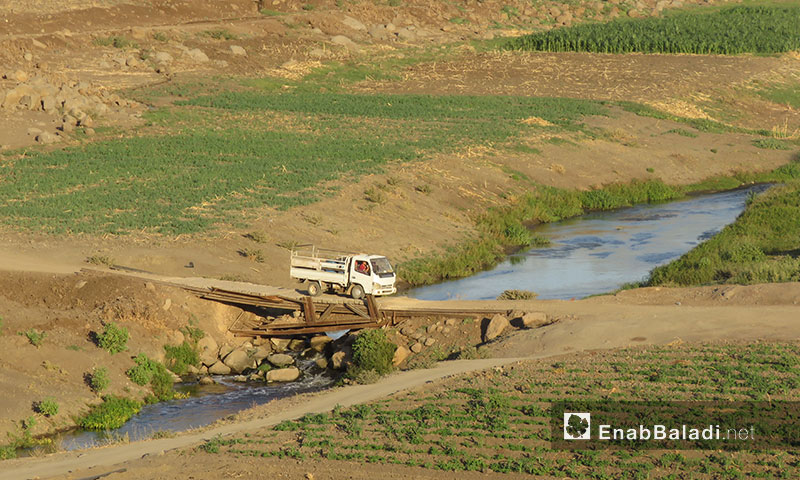



A number of files took over the landscape following the Syrian regime’s control of the northern countryside of Homs due to the “reconciliation” agreements, among which is the status of the properties and real-estates left by their owners during the battles in the past a few years, especially when their original owners decided to return to their homes with the end of the military actions and since the current talks are all about the return of “security and stability.”
The military operations in 2012 led to the displacement of the people of several towns in Homs’ rural parts, who left their lands and houses, including the population of the village of Um Sharshouh, the majority of which is Christian, whose village was turned into a confrontation line until the opposition factions controlled it in April 2014.
Today, the people of the Um Sharshouh are going back to their village, where they are filing lawsuits against the people who have appropriated their lands in the past areas and utilized them in different fields, on top of which is agriculture, after they entered the lands according to contracts with the Sharia Courts of the opposition factions, which put their hands on them immediately after controlling the area.
Following the Assad’s forces and the militias backing them to the village of Um Sharshouh at the first days of the military operations in rural Homs, the people were coerced to leave to other areas, fearing the battles. However, they left their homes only with the “clothes” they had on, for they were prevented from taking their possessions out.
Issa, a young man from the village, who refused to reveal his full name, told Enab Baladi that Assad’s forces have once entered the village in agreement with some people who thought that with allowing them in, they would be protecting the village, but reality was something else. “We were forced to evacuate our houses and were not allowed to take our positions on the pretext that we would return in a few days, but the shabiha, the regime’s thugs, entered instead and looted the houses completely.”
The young man added that the regime was not trying to protect the Christians from the opposition factions, rather it wanted to move the battle away from the neighboring Alawite villages, thus turning Um Sharshouh into a battle field which led to a great level of destruction, reaching the point where the opposition factions controlled it in 2014.
When the Christians of Um Sharshouh left their village, they failed to reach their agricultural lands or return to them later on. Accordingly, the factions affiliate Sharia courts took hold of them and rented them to the area’s residents in return for money which they also took. The courts also prevented the neighbors of the area’s Christians from planting the lands and sending them the crops’ returns, on the allegation that they are loyal to the regime even if an official rent contract has been signed by the neighbor and the Christian owner of the land.
Ahmad, from the village of al-Farhaniyah, told Enab Baladi that “After the Christians have exited the village, they could not reach their lands. So, one of my Christian neighbors authorized me to cultivate the land and send him the gains, but the Sharia courts and the factions put their hands on the lands and presented them at a public auction for rent, which prevented us from helping our Christian neighbors and forced some of them to sell their lands for little prices as they lost hope of returning to them.”
As a result of the poor living conditions of rural Homs’ residents during the siege which Assad’s forces imposed on the area, some of the inhabitants were forced to rent the lands of the Christian people from the courts to cultivate them and secure a simple income. When the area signed the reconciliation agreement with the Syrian regime, the Christian people where able to reach their lands and destroyed houses, but they managed this through filing lawsuits against the people who rented their lands from the Sharia courts.
“Abu Khalil,” a framer from the city of Talbiseh, explained to Enab Baladi that he rented a land from the Sharia court for three thousand Syrian pounds per dunum; the land was planted with fruitful trees.
During the rental period, gangs cut the trees and sold them without his knowledge, which caused him a great loss, especially after the return of the original owner of the land, who filed a lawsuit against him, demanding a compensation for the investment during the past seven years.
“Abu Khalil” explained that the compensation demanded by the owner of the land amounts to three million Syrian pounds, pointing out that he communicated with some of the sharia court’s figures who stayed in rural Homs, but they refused to testify for his advantage, saying that they might be held accountable.
In an interview with Enab Baladi, one of the Um Sharshouh village’s Christian residents said: “Some of the village’s people have been stripped of their humanity, no one cares about the haram (forbidden) and the halal (permissible), and another group has been incited by the neighboring Alawite villages to file lawsuits [. . .]. The military aircraft of the regime destroyed their homes. Can they sue the army and demand Compensation? “
if you think the article contain wrong information or you have additional details Send Correction